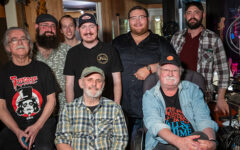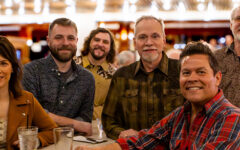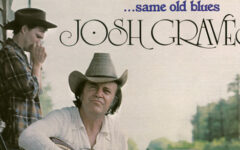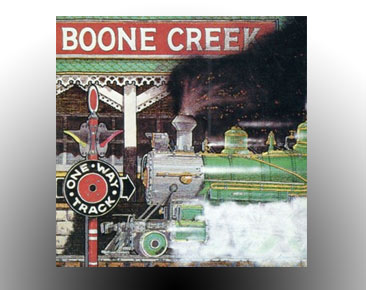
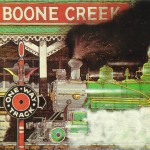 To many young bluegrass converts, the name Boone Creek might not ring a bell. For those who are not familiar with that name, how do the names Jerry Douglas, Terry Baucom, and Ricky Skaggs grab ya?
To many young bluegrass converts, the name Boone Creek might not ring a bell. For those who are not familiar with that name, how do the names Jerry Douglas, Terry Baucom, and Ricky Skaggs grab ya?
This short-lived group was a progressive bluegrass powerhouse during its short existence. Formed following Skaggs and Douglas’ departure from J.D. Crowe & the original New South, Boone Creek’s1978 LP One Way Track brought together the all-star talent of Terry Baucom (banjo, fiddle, harmony vocals), Steve Bryant (bass, bass vocal), Wes Golding (guitar, lead and harmony vocals), Jerry Douglas (dobro, harmony vocals), and Ricky Skaggs (mandolin, fiddle, guitar, lead and harmony vocals).
On One Way Track, Boone Creek does many traditional bluegrass numbers, but gave them a progressive makeover; however, there are two original numbers that are stellar and really raise the bar for bluegrass of this time period.
One Way Track’s title song is incredibly powerful. If the band had done nothing but record this song, they would have paid their dues to bluegrass. Skaggs and Golding co-wrote the song, and Skaggs even re-recorded the song with Kentucky Thunder on History Of The Future. This is one of those opening numbers that makes it hard to listen to the rest of the album because you just keep playing this track over and over. Once you hear the opening chops of Ricky’s mandolin, the slide of Flux’s dobro, and the thump of Steve Bryant’s electric bass, you know this recording is special. The tune chugs along like a train, and you will find yourself singing it all day. One Way Track is a great example of the new songs that came out of progressive bluegrass at this time.
This band was so tight. Steve Bryant, who I consider one of the best electric bassists, glues together Douglas’ dobro and The Duke of Drive’s five-string. Couple that with Skaggs’ instrumental prowess on mandolin and fiddle, you’ve got a progressive bluegrass band that knows how to tastefully push the envelope as good as anybody.
Boone Creek’s instrumental expertise is on full display for the album’s lone instrumental track, Sally Gooden. It is worth listening to every second in this six-minute version. The tune starts out with just Skaggs’ fiddle and Baucom’s banjo, but after a while everybody joins in the fun. Ricky’s mind-numbing talent on both the fiddle and mandolin shines on this cut, and shows why he was snatched up to be a member of Emmylou Harris’ Hot Band shortly following this album.
As I mentioned earlier, One Way Track is primarily bluegrass standards brought up to speed with the progressive movement of the time. One of my favorites on the album is the band’s rendition of Bill Monroe’s Can’t You Hear Me Calling. Boone Creek’s take on this classic is a stark contrast from Monroe’s original recording which featured, “The Voice With A Heart,” Mac Wiseman up front. Boone Creek kicks the tempo up a few notches, and removes the fiddle, while adding a dobro and electric bass. This makes for a more contemporary sound with a very heavy rhythm section. Wes Golding’s lead vocals are superb, and Ricky’s sky-high tenor bolster this already memorable recording.
I’m Blue, I’m Lonesome has been covered by about everybody (The Seldom Scene, The Del McCoury Band, The Grascals featuring Bocephus, among others), and Boone Creek’s version stands up among any of them. Dudley Connel says that this tune was written by the two “lonesomest” people in music: NOT Liberachi and Jim Nabors, but Hank Williams and Bill Monroe. The vocals resonate the song’s namesake: blue and lonesome. Golding and Skaggs make sure the song drips with both of these qualities.
This song is also unique because it features the fiddle work of Terry Baucom. Known as being a master of the five-string, many don’t know or have forgotten that he is also a fine fiddler, and that he had initially come to the band to play fiddle, with Marc Pruett set to play banjo. Bauc plays a bluesy fiddle on this track that fits the song beautifully.
There are a couple of Gospel numbers on the album: Little Community Church House and Daniel Prayed. Ricky appeared on the classic recording of Daniel Prayed from the old album Gospel Echoes Of The Stanley Brothers while serving as a Clinch Mountain Boy under Ralph Stanley, and alongside his childhood friend, Keith Whitley. Ricky resurrected the old tune when Boone Creek was formed, and the simplicity of its arrangement shows the band’s reverence to tradition, although they were a progressive bluegrass band. Daniel Prayed features a mandolin and guitar and the powerful quartet of Ricky, Wes, Jerry, and Terry to deliver this Gospel classic. This one will make you pat your foot all the way to the church house.
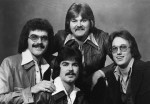 Mississippi Queen is the other original song on the album, also written by Wes Golding. Another prime example of the new progressive tunes of the era, Mississippi Queen is a flying bluegrass song and a true gem. Baucom’s banjo and Douglas’ dobro are especially crisp on this cut and help push the song along. Baucom introduced this one to Doyle Lawson when Quicksilver was looking for performance material. A great recording of Doyle Lawson and the original Quicksilver (Doyle, Terry Baucom, Lou Reid, and Jimmy Haley) performing Mississippi Queen can be found on the Quicksilver retrospect, School Of Bluegrass.
Mississippi Queen is the other original song on the album, also written by Wes Golding. Another prime example of the new progressive tunes of the era, Mississippi Queen is a flying bluegrass song and a true gem. Baucom’s banjo and Douglas’ dobro are especially crisp on this cut and help push the song along. Baucom introduced this one to Doyle Lawson when Quicksilver was looking for performance material. A great recording of Doyle Lawson and the original Quicksilver (Doyle, Terry Baucom, Lou Reid, and Jimmy Haley) performing Mississippi Queen can be found on the Quicksilver retrospect, School Of Bluegrass.
Other classic bluegrass songs that appear on One Way Track are In The Pines, Head Over Heels, and No Mother Or Dad. The re-release of One Way Track in 1991 includes three bonus live recordings of John Prine’s Paradise, Pathway Of Teardrops, and Walking In Jerusalem.
There are very limited recordings of Boone Creek available, for they were only for such a short time. They recorded a pair of records: one for Rounder and one for Sugar Hill (One Way Track). An occasional track from their debut album on Rounder Records will pop from time-to-time, but the album itself is long out of print. One of the tracks, Memory Of Your Smile, can be found on the Rounder Records’ fortieth anniversary set The Rounder Records Story. That track features a much more progressive sound than is even heard on One Way Track, for the band included electric guitar, piano, drums, etc.
One Way Track is available on Sugar Hill Records (SH-CD-3701) and can be purchased from County Sales and the Classic Country Connection. One Way Track can also be purchased digitally on iTunes and on Amazon Music.
Here’s a Boone Creek trivia question which I got from Robert Iery’s Bluegrass Routes: the ONLY bluegrass trivia board game.
What short-time member of Boone Creek sat on his bass amp at the back of the stage and stared at the wall during his last show with the band?
Hint: He was also a member of The Bluegrass Alliance at age eighteen.
Check back next week for the answer!


